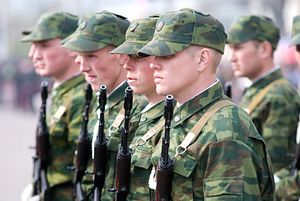Tuesday, the Collective Security Treaty Organization (CSTO), Russia’s answer to NATO, gathered in Dushanbe for a summit. Attended by the presidents of the six member states — Russia, Kazakhstan, Kyrgyzstan, Belarus, Armenia, and the host, Tajikistan — the summit was preceded by a day of bilateral meetings. ISIS, also known as Islamic State, dominated the conversation and an unnamed source indicated that if Tajikistan asked, Russian troops would return to the Afghan border.
Of the three Central Asian states that share borders with Afghanistan, only Tajikistan is a member of the CSTO. Uzbekistan withdrew from the group in 2012. The idea of Russians once again at the Afghan border isn’t radical. Up until 2005, Russian border guards helped Tajikistan patrol the Tajik-Afghan border. In 2011, an RFE/RL article featured General Sharaf Fayzulloev, then-deputy commander of Tajikistan’s border guard forces discussing how Russia and the U.S. helped modernize the Tajik border service:
Fayzulloev said Tajikistan inherited old border posts, technical equipment, vehicles, weapons, and other equipment — much of which is decades old and is now obsolete.
Fayzulloev said that thanks to the United States, all border crossings along the Tajik-Afghan border and the country’s international airports are equipped with modern technology.
He said Tajikistan continues to discuss border cooperation with Russia, but the return of Russian guards to the Tajik-Afghan border is not on the agenda.
Russia maintains three military installations in Tajikistan — near Kulob, Qurghonteppa, and Dushanbe — all part of the 201st Motor Rifle Division. Their presence was felt in Dushanbe during the summit as roads were shut to civilian traffic and Russian soldiers stood guard. President Vladimir Putin pledged “help and support” to Tajikistan, in context of the trouble in Dushanbe in early September and the widely-hyped (but largely unsupported) regional fear of the threat of ISIS.
Kommersant, a Russian newspaper, quoted an unnamed official as indicating that Russians may return to the Afghan border if asked. As Khaama Press, an Afghan news agency, wrote, “the Russian forces may return once they receive a request from the government of Tajikistan,” but Dushanbe has “only requested CSTO’s technical assistance so far.”
Eurasianet has an excellent rundown of what several of the CSTO presidents had to say with regard to ISIS. The short version is that Central Asian leaders continue to hype the ISIS threat, sans nuance. In April, Noah Tucker of Registan.net commented that ahead of the March parliamentary elections in Tajikistan, a rumor that ISIS was readying for an invasion of Central Asia via Afghanistan became particularly popular. In May, CSTO members simulated fighting off such an invasion.
Nearly a year ago, Casey Michel wrote for The Diplomat that Moscow was deliberately stirring up regional fears with regard to ISIS, a trend that has continued:
There’s a peculiar belief currently coursing through intellectual circles in Moscow. Combining the bubbling traits of nativism and Islamophobia, and playing squarely into the hands of those seeking to amp up the region’s security structures, certain circles have begun pumping up the terror and tenor of the threat posed by the Islamic State.
The CSTO summit ends just as the 70th United Nations General Assembly kicks off in New York, and provided the CSTO members a chance to discuss their collective agenda for the general debate at the end of the month. TASS, according to Asia-Plus, reported that the CSTO members plan to make several joint statements on “space weapons and countering international terrorism.”

































